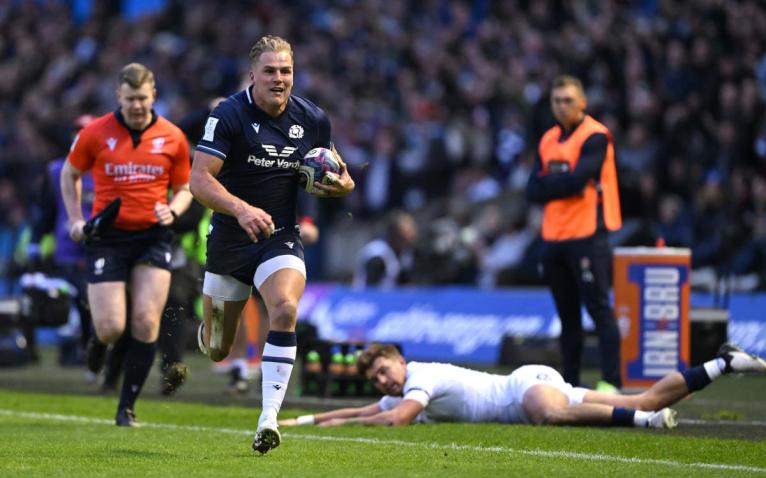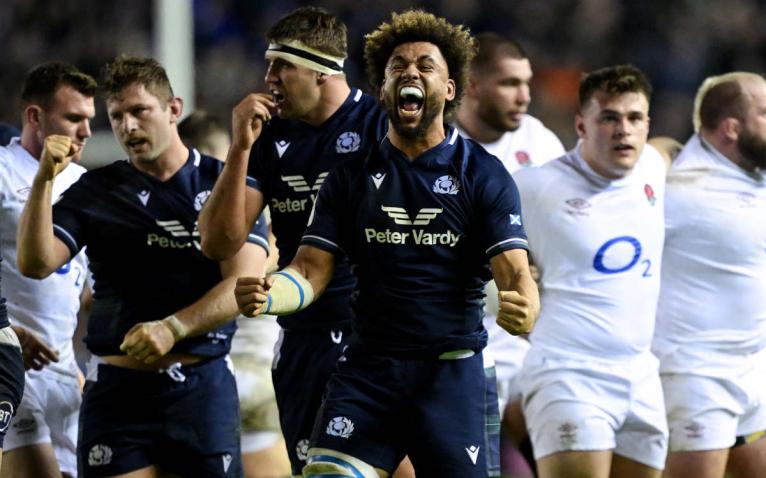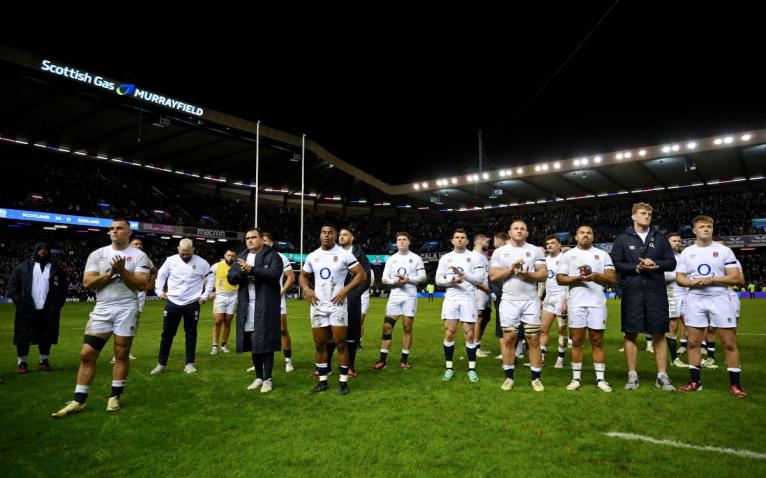A question for you. What does the Calcutta Cup have in common with the short-haired bumble bee, fringed lamp-shades, rag-and-bone men, rural bus services, Green Shield stamps, clean rivers and Worcestershire sauce-flavoured Twiglets? Correct. It’s something else you just don’t see in England anymore.
Not since 1896 have Scotland four-peated in McCrunch; only once before in the Six Nations have they carted off the Calcutta Cup by a more impertinent margin. It’s becoming a hex, indeed, Scotland appear to have pinched something from the English that the English may never get back. It may not quite make up for 42 billion barrels of North Sea oil but it’s a start.
The taverns and tap rooms of Edinburgh, assuredly, will have been mocking the midnight bell late on Saturday and with every good reason. Certainly, you doubt many will have made it to matins on Sunday morning, although those who did would’ve doubtless been offering up a prayer of thanksgiving for Duhan van der Merwe. Has any other Scottish player been sin-binned at Murrayfield to a standing ovation? Not just the man who scored the three, match-winning tries but who signed off by putting a Sassanach in an unseemly – albeit illegal – pile. St. Andrew may have to move over.
The irony, of course, being that the South African-born, Red Rose nemesis only got to play for Scotland thanks to an Englishman, Richard Cockerill, who signed him for Edinburgh in 2017 after a miserable stint in Montpellier, this despite the fact he failed his medical with a nasty hip injury. Cockerill nabbed him anyway – remarkably so, given van der Merwe reportedly spent his first six months on the physio’s table – and, thanks to rugby’s residency rules, the rest is history. Arguably, if Cockerill had drawn a long, red line through the doctor’s report, England would’ve now won two Calcutta Cups in a row.

On the day, though, the burred thistle and the prickly rose, predictably, produced a scratchy game, albeit scented by five fabulous tries. Neither team could establish much in the way of fluency or control but, no question, Scotland adapted to England far better than England dealt with Scotland. And when he finally sobers up, you suspect that will bring the widest smile to Head Coach, Gregor Townsend’s face.
Yes, Scotland beat the noisy neighbours, this in a country whose very anthem celebrates sticking it to the English. It’s binary and it matters. But, more relevantly, you sense they discovered something about themselves; delivering in rip-roaring style despite the weight of expectation, despite going ten points down in the blink of an eye and all of this in the context of a dubious, desolate defeat a fortnight before. And, of course, had that hugely controversial, TMO call gone their way, Scotland would now be Italy short of a potential Slamdown with Ireland in Dublin. Let’s not go there.
Finn Russell was at his nerveless best. Down in Bath, he can’t hit a bison’s backside off the tee right now but at Murrayfield he nailed six from six and kept Scotland out of reach of a flailing, shapeless England.
Van der Merwe was the screaming headline but further down the column inches, other names stood out. The blue bench – to the surprise of many – bested the white one, Jack Dempsey was tougher than wagon leather and Finn Russell was at his nerveless best. Down in Bath, he can’t hit a bison’s backside off the tee right now but at Murrayfield he nailed six from six and kept Scotland out of reach of a flailing, shapeless England. It seems the man famed for his knockout punches also boasts a very decent jab.
England for their part are in a hole, in this case, the white hole of Calcutta. For the first fifteen minutes, Steve Borthwick and his team looked almost Irish; aggressive, clinical and bossing the moss thanks largely to a magical try from the very man the Head Coach parachuted in – George Furbank – to sprinkle some much-needed stardust.
But, thereafter, it was a complete bugger’s muddle; needless free-kicks at scrums, cheap offside penalties, poor decision-making, a dolly-dropped restart, a ponderous procession of one-out runners, kicks out on the full, passes into touch, knock-ons, defensive misreads, ruck infringements and woeful supporting lines. In all, England racked up a staggering 22 turnovers and 24 handling errors, far too many of them unforced. You do not win Test matches with numbers like that.

Frankly, it’s baffling. Head Coach, Steve Borthwick refers often to ‘a young team’ yet his starting XV in Scotland averaged 28 years of age and 47 caps. What’s more, these are players who’re ripping it up for their clubs in the Premiership. Why else would they be selected? So why can’t they reproduce anything like that form – or, at times, even a grasp of the basic skills – in the national team?
Ireland, granted, are ten miles down the road yet you watch players slip in and out of the structure seamlessly. The fledging Ciaran Frawley scarcely put a foot wrong in Dublin against Wales and Jack Crowley is already looking like the straw who’ll be stirring the cocktail for years to come. Against Italy in Round Two, Ireland blooded umpteen fresh faces, scored six tries and didn’t concede a point. There is clarity and cohesion.
Like Eddie Jones before him, Steve Borthwick is pleading forbearance. ‘It’s going to take some work,’ he said. And he’s not wrong.
England appear to have neither. Their new defensive structure is a building site – Felix Jones reportedly said it took 14 Tests before the Springboks got the hang of his blitz system – and the attacking game has been a derelict wasteland for two years. But like Eddie Jones before him, Steve Borthwick is pleading forbearance. ‘It’s going to take some work,’ he said. And he’s not wrong.
But just how patient are England’s supporters prepared to be? It’s all the more pertinent a question given their remaining fixtures for 2024 are Ireland at Twickenham, France in Lyon, Japan in Tokyo, New Zealand in Dunedin, New Zealand in Auckland, followed next autumn by New Zealand (again), Australia, South Africa and Japan (take two), this for a side who, under this Head Coach, have yet to beat a team ranked higher than themselves in the World Rankings. It could easily get very ugly.

Elsewhere? Oh mio Dio, Italia. Defensively in Lille they were a wall of sandbags – and they needed to be – as French flood waters lapped around their posts in a first half storm but, a man to the good in the second, they cut loose and stretched France’s flagging elastic to snapping point, their end to end, multi-phase, all hands on the ball, Ange Capuozzo score being, arguably, the team try of the tournament so far. Just a crying shame the French TV Director, ITV’s post-match analysis and BBC’s Six Nations’ Rugby Special didn’t let us see it again in all of its majesty.
Which left Paolo Garbisi with a shot to win Italy’s most famous victory over the Gauls since Julius Caesar outlasted the revolting, Gallic, chieftain Vercingetorix at the Battle of Alesia in 52BC. Except that the ball toppled off the tee and, with the shot clock still running, Garbisi had just seven seconds to straighten himself up and take aim only to clip the upright. 13-13; kiss your sister time.
France almost suddenly, they look frenetic, disorganised and, above all, ill-disciplined; if you’re counting, that’s now two red cards and two yellows in three matches.
Italy, you suspect, would’ve been wailing at the dressing-room walls but the measure of their quite stupendous performance was that France were 1/33 to win that game. 1/33? You can get better odds on the Tories winning the next election. Indeed, if you factor in Italy’s U20s steamrollering their French counterparts in Beziers on Friday night, then Italian rugby – wonderfully – is perhaps beginning to rumble.
The French rugby media, not surprisingly, has been scathing. Midi-Olympique – with a nod to the brutal, cobbled Paris/Roubaix cycling classic which finishes near Lille – went with the headline ‘L’Enfer du Nord’/‘The Hell of the North’ while Libération said the French team ’S’Enforce Dans La Crise’/‘Sinks Into Crisis.’ No question, the French have lost their ju-ju; the obvious answer being that their ju-ju is away with the national Sevens’ squad. But, almost suddenly, they look frenetic, disorganised and, above all, ill-disciplined; if you’re counting, that’s now two red cards and two yellows in three matches.

All of which leaves them fourth in the table, une calamité until you consider where they’d be had TMO Brian MacNeice ruled against them in Murrayfield and had either Sébastien Taofifénua or Paul Boudehent been ticketed for encroaching on Garbisi as he lined up his Hail Mary penalty in Lille; to be precise they’d be P3 W0 L3 and bottom of the table. Right now, they’re hanging on by dumb luck alone.
In Dublin, Warren Gatland thought a 31-7 scoreline wasn’t a fair reflection of the Ireland/Wales game. Andy Farrell agreed. He thought Ireland should’ve had 40, conclusive proof, should you need it, that two men can walk side-by-side down the same street and come away with a completely different view. Gatland will have liked his side’s raw tenacity, Farrell his team’s 14-man, try-bonus point at the death. Put it this way, if Scotland could convert three-try wins into four as Ireland so often do, they’d have their Six Nations’ destiny in their own hands. As it is, yet another Irish try-bonus point win at Twickenham in a fortnight will seal the green deal.



Comments
Join free and tell us what you really think!
Sign up for free